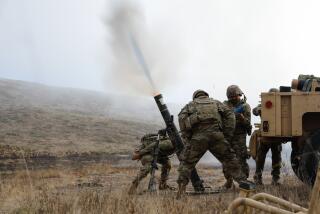From Here to Retirement : Hundreds Attend Point Mugu Baseâs Fair on Post-Navy Life
The economic anxiety gnawing at many Americans has slipped through the gates of Point Mugu Naval Warfare Center, infiltrating the ranks of the 6,500 civilian and military employees at the base.
Hundreds of Point Mugu workers swarmed into the baseâs first retirement exposition Thursday to gather information, hear speakers and attend workshops on federal pensions, second careers and other prospects for life after the Navy.
The daylong event was the first such seminar that was open to everyone on the base, not just those nearing retirement.
It drew military and civilian employees of all ages. Many said they are feeling the pressure of federal defense cuts that are gradually but significantly shrinking the Point Mugu work force.
Since October, 1990, the number of military employees at Point Mugu has shrunk by more than 400, from 2,916 to 2,481.
âWhat weâve been dealing with here is the downsizing of the Navy,â said Fred Stevenson, who works with a volunteer group of retired executives sponsored by the Small Business Administration.
Stevenson, who worked the SBA table at the seminar, said he was besieged by dozens of Point Mugu employees in just the first two hours of the event.
Most of them were military personnel, he said. âThey know theyâre going to be out on the street.â
Many of them seem unprepared, he said. âWhatâs amazing is people are thinking about going into business and they havenât got the least idea how to start,â Stevenson said.
The Navy, predicting heavy defense cutbacks by Congress and the President, is reducing its forces through attrition, said Alan Alpers, acting public affairs officer for Point Mugu.
In the military, personnel are forced to retire if they arenât promoted to the next rank after a certain number of years.
Fewer positions mean fewer opportunities, which can fuel the desires of the remaining military personnel to change careers.
âThere are fewer places for you to go, so you start looking to get out,â Alpers said.
One of the military men at the retirement exposition was Lt. Gary Campbell, 45.
Campbell acknowledged that âin the military, people are being âriffed,â â a reference to the government term âreduction in force.â
He said he plans to retire next year because, after four years of shore duty, it is his turn to go back to sea and âthe idea of going back on the boat didnât appeal to the wife.â
He hopes to start a career in environmental management.
But after spending the last 16 years in the Navy, he said he is nervous about jumping back into the world of job-hunting and interviewing.
Campbell pointed out that civilian workers at the base donât have to worry about being forced to retire.
âTheyâre . . . probably more secure in their job than most civiliansâ who have jobs off military bases, he said.
There is no mandatory retirement age for most civil service employees, including most of the 4,032 civilian workers at Point Mugu.
Despite their apparent job security, some civilians at the retirement fair said they are feeling the squeeze from the downsizing of the base.
Ventura resident Alice Finn, 53, works in the financial department of Electronic Warfare at the base. She came to the retirement event to explore a possible second career in the medical field.
âThereâs a lot of opportunities that are closedâ at the base because of the downsizing, she said. âIâd like to get into something I could use till I decide to stop working.â
Richard Carino, 66, said he needs to keep working to put his youngest child, now in high school, through college.
But Carino said he feels that people at the base think he should give up his job--because he qualifies for full retirement benefits.
âIâm not planning to retire. But I think the government is planning to retire me,â he said.
Carino is one of the 549 employees, or more than one-eighth of all civilian workers at Point Mugu, who are either eligible to retire now or will be by the end of 1993.
Their reluctance to retire has caused the number of civilians at the base to decline at a slower rate than military workers. The base is down only about 300 civilian employees from its peak of 4,300 in 1990, Alpers said.
Point Mugu retirement counselor Peggy Topham said that âwe canât coerce anyone into retirement. Thatâs against the rules.â
Topham said she believes that many employees postpone retirement because they donât know what they would do with their lives after Point Mugu.
But civilian Andy Anderson said most people hang onto their jobs at the Navy base because theyâre frightened that there are no jobs in the outside world.
âI think about 99% of them are staying because of the economy,â said Anderson, 52, an Oxnard resident and industrial specialist at the base who will retire on Jan. 3.
For his retirement, Anderson said, âIâm moving to Florida . . . if I sell my house.â
Philip Harkins, 45, who stood chatting with Anderson at the retirement fair, said he signed up for retirement Thursday after working 28 years at the base.
Harkins said he feels financially secure enough to stop working. But he said he is concerned about voluntarily leaving a job at a time when so many others are losing theirs.
âThatâs the scariest part,â he said.
More to Read
Sign up for Essential California
The most important California stories and recommendations in your inbox every morning.
You may occasionally receive promotional content from the Los Angeles Times.










